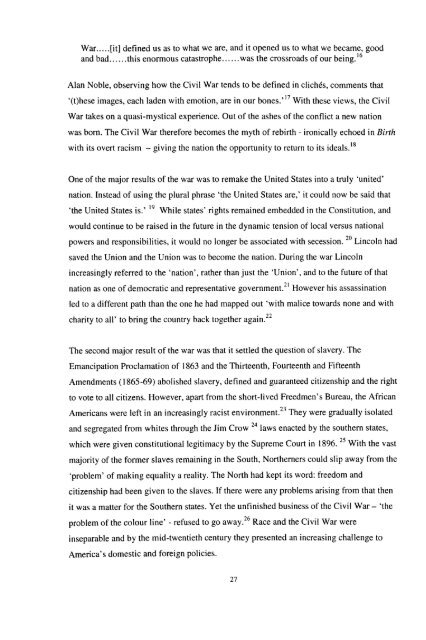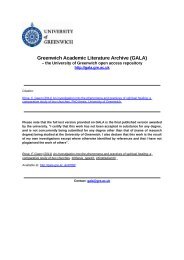Download (3483kB) - Greenwich Academic Literature Archive ...
Download (3483kB) - Greenwich Academic Literature Archive ...
Download (3483kB) - Greenwich Academic Literature Archive ...
- No tags were found...
You also want an ePaper? Increase the reach of your titles
YUMPU automatically turns print PDFs into web optimized ePapers that Google loves.
War.....[it] defined us as to what we are, and it opened us to what we became, goodand bad..... .this enormous catastrophe...... was the crossroads of our being. 16Alan Noble, observing how the Civil War tends to be defined in cliches, comments that'(t)hese images, each laden with emotion, are in our bones.' 17 With these views, the CivilWar takes on a quasi-mystical experience. Out of the ashes of the conflict a new nationwas born. The Civil War therefore becomes the myth of rebirth - ironically echoed in Birthwith its overt racism - giving the nation the opportunity to return to its ideals. 18One of the major results of the war was to remake the United States into a truly 'united'nation. Instead of using the plural phrase 'the United States are,' it could now be said that'the United States is.' 19 While states' rights remained embedded in the Constitution, andwould continue to be raised in the future in the dynamic tension of local versus nationalpowers and responsibilities, it would no longer be associated with secession. 20 Lincoln hadsaved the Union and the Union was to become the nation. During the war Lincolnincreasingly referred to the 'nation', rather than just the 'Union', and to the future of thatnation as one of democratic and representative government. 21 However his assassinationled to a different path than the one he had mapped out 'with malice towards none and withcharity to all' to bring the country back together again. 22The second major result of the war was that it settled the question of slavery. TheEmancipation Proclamation of 1863 and the Thirteenth, Fourteenth and FifteenthAmendments (1865-69) abolished slavery, defined and guaranteed citizenship and the rightto vote to all citizens. However, apart from the short-lived Freedmen's Bureau, the AfricanAmericans were left in an increasingly racist environment. ' They were gradually isolatedand segregated from whites through the Jim Crow 24 laws enacted by the southern states,which were given constitutional legitimacy by the Supreme Court in 1896. 25 With the vastmajority of the former slaves remaining in the South, Northerners could slip away from the'problem' of making equality a reality. The North had kept its word: freedom andcitizenship had been given to the slaves. If there were any problems arising from that thenit was a matter for the Southern states. Yet the unfinished business of the Civil War - 'theproblem of the colour line' - refused to go away. 26 Race and the Civil War wereinseparable and by the mid-twentieth century they presented an increasing challenge toAmerica's domestic and foreign policies.*) "327
















